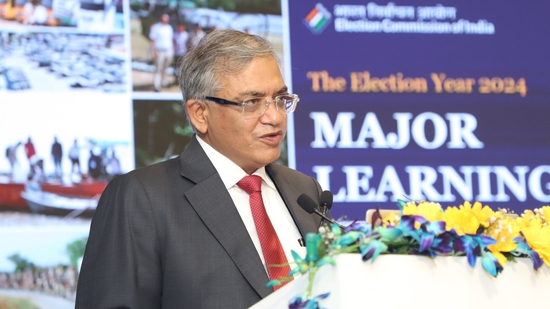Almost a year after he was appointed an Election Commissioner, Gyanesh Kumar was elevated to Chief Election Commissioner (CEC) on Monday, amidst sharp dissent from Leader of Opposition Rahul Gandhi. The selection, made under the provisions of the contentious 2023 law, has reignited debates about the independence of the Election Commission of India (ECI) and the transparency of its appointment mechanism.
The 30-minute meeting of the selection committee, comprising Prime Minister Narendra Modi, Rahul Gandhi, and Union Minister Amit Shah, was marked by tension as Gandhi urged the deferment of the process until the Supreme Court delivers its verdict on challenges to the Chief Election Commissioner and Other Election Commissioners (Appointment, Conditions of Service and Term of Office) Act, 2023.
This law, which replaced the Chief Justice of India with a Union Minister in the selection panel, has been at the heart of legal and political disputes since its enactment.
In his dissent note, Rahul Gandhi reportedly stated, “The process should be deferred until the Supreme Court rules on the petitions challenging the 2023 law. Proceeding now undermines the spirit of judicial review and raises questions about the legitimacy of the appointment.” The Supreme Court is to hear the matter on Wednesday.
Kumar was appointed to the EC on March 14, 2024, less than two months after he retired from the IAS. He assumed office on March 15 and the very next day, the Election Commission of India announced the schedule of the Lok Sabha elections.
His tenure as CEC will last till January 26, 2029, which will see him helm the Commission as it conducts 20 Assembly elections, the elections for President and Vice-President in 2027, and prepares for the 2029 Lok Sabha elections.
A 1988-batch IAS officer from the Kerala cadre, Gyanesh Kumar is currently the senior-most among the two Election Commissioners in the three-member panel that was led by Rajiv Kumar. He served as the Secretary of the Cooperation Ministry at the time of his retirement in January 2024.
In his career, he served as Parliamentary Affairs Secretary, Joint Secretary and Additional Secretary in the Ministry of Home Affairs (MHA), and Joint Secretary in the Ministry of Defence. In Kerala, he worked across several departments, including the Public Works Department and Finance. He was also the resident commissioner at Kerala House in Delhi from 2012 to 2016.
An Additional Secretary in MHA from 2018 to 2021, Kumar played a pivotal role when Article 370 was abrogated in 2019 and Jammu & Kashmir was split into the two Union Territories of Ladakh and Jammu & Kashmir.
The Narendra Modi government’s trust in Kumar as a bureaucrat is illustrated by the fact that he was not only given the responsibility of formulating the Jammu and Kashmir Reorganisation Bill, one of the most secretive Bills ever brought by a government but also that he was involved in the setting up of the Ram Janmabhoomi Teerth Kshetra Trust.










